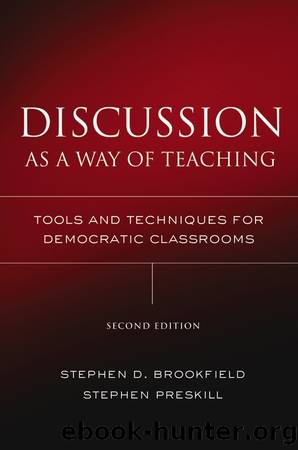Discussion as a Way of Teaching by Stephen D. Brookfield & Stephen Preskill

Author:Stephen D. Brookfield & Stephen Preskill
Language: eng
Format: epub
Publisher: Wiley
Published: 2012-05-29T00:00:00+00:00
CONCLUSION
This chapter has provided just a few of the innumerable strategies for assisting people in doing a better job of communicating across differences. What we have tried to do is to present a few principles that underlie good discussions in general but that inform especially conversations involving cultural differences and feelings of racial intolerance. We have stressed that groups must openly confront racism, taking time to express anger and grief over the unfulfilled lives that result directly from bigotry. People must frankly assert their cultural identifications and the meaning these identities have for their lives. Teachers must try to create conditions that make people more comfortable with diversity, even as they use difference to generate greater respect for each other.
Doing these things is not an exercise in political correctness in which only the stories of those who feel themselves oppressed are told. Rather it is an attempt to offer as many different interpretations of experience as possible. A nationâs story can be told many different ways, but it is really only recently that we have begun to acknowledge this. A Native American interpretation of U.S. history is going to be very different from an interpretation put forward by a Russian Jew, just as an African Americanâs story will be starkly at odds with that of a descendant of a plantation owner, and an Aboriginal tale will be in stark contrast to that told by a European invader. The object of multicultural dialogues is to carve out spaces for many different versions of experience and to encourage people to cope with their complexity and to revel in their richness.
We do this not to impose equal acceptance of every story advanced but to create new appreciation for collective depth and diversity. We oppose the hegemonic intentions of those who claim there is only one, highly privileged American, English, Canadian, South African, or Australian story that must be protected and perpetuated. It is this hegemony of the official story, this enemy of pluralism, multiplicity, and complexity, that genuine dialogues about and across differences must be enjoined to combat (Bruner, 1996). When we honor a plethora of stories and interpretations and when we strive through discussion to find a place within our own stories for at least some of these other perspectives, we can begin to rebuild and reinvent commonalities. Unity does not entail jettisoning cultural richness and reinstating old, canonical models. This solution might seem neat and precise, unburdened by the messiness and turmoil of an ongoing conversation about our differences. But it is also blatantly undemocratic. It rejects the value of multiple stories and the importance of a cultural conversation that simply has no finish.
Download
This site does not store any files on its server. We only index and link to content provided by other sites. Please contact the content providers to delete copyright contents if any and email us, we'll remove relevant links or contents immediately.
| Anthropology | Archaeology |
| Philosophy | Politics & Government |
| Social Sciences | Sociology |
| Women's Studies |
Cecilia; Or, Memoirs of an Heiress — Volume 1 by Fanny Burney(32558)
The Great Music City by Andrea Baker(32020)
Cecilia; Or, Memoirs of an Heiress — Volume 2 by Fanny Burney(31956)
Cecilia; Or, Memoirs of an Heiress — Volume 3 by Fanny Burney(31942)
We're Going to Need More Wine by Gabrielle Union(19046)
All the Missing Girls by Megan Miranda(16031)
Pimp by Iceberg Slim(14508)
For the Love of Europe by Rick Steves(14121)
Bombshells: Glamour Girls of a Lifetime by Sullivan Steve(14077)
Talking to Strangers by Malcolm Gladwell(13371)
Norse Mythology by Gaiman Neil(13370)
Fifty Shades Freed by E L James(13243)
Mindhunter: Inside the FBI's Elite Serial Crime Unit by John E. Douglas & Mark Olshaker(9344)
Crazy Rich Asians by Kevin Kwan(9292)
The Lost Art of Listening by Michael P. Nichols(7506)
Enlightenment Now: The Case for Reason, Science, Humanism, and Progress by Steven Pinker(7314)
The Four Agreements by Don Miguel Ruiz(6765)
Bad Blood by John Carreyrou(6622)
Weapons of Math Destruction by Cathy O'Neil(6281)
